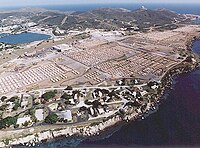| Part of the aftermath of the 1991 Haitian coup d'état | |
 Most Haitian refugees were interned in a tent camp on a disused air terminal at Guantanamo, seen here. | |
| Date | 1991-1994 |
|---|---|
| Location | Guantanamo Bay Naval Base |
| Participants | Haitian boat people Government of the United States |
| Outcome |
|
The Haitian refugee crisis, which began in 1991, saw the US Coast Guard collect Haitian refugees and take them to a refugee camp at Guantanamo Bay.[1] They were fleeing by boat after Jean-Bertrand Aristide, the democratically elected president of Haiti, was overthrown and the military government was persecuting his followers.[2] The first camp reached a maximum of 12,500 people.[3] It was then reduced to 270 refugees who either had HIV or were related to someone who did.[4] The reduction was the result of the US policy adopting a strict policy of repatriation for both those found at sea and most of those living in Guantanamo.[5] The HIV+ refugees were quarantined in a section of the military base known as Camp Bulkeley and faced human rights violations.[3] They were brought to the United States after US District Judge Sterling Johnson Jr. ruled the camp was an "HIV prison camp."[6][1]
In 1994, Guantanamo was again used as a refugee camp.[7] This time both Cubans and Haitians were detained.[8] Roughly 50,000 refugees were held at the camp.[9] There were several important court cases and policies made that determined conditions and often location for the refugees. Haitians stopped being held at Guantanamo the mid 1990s.[9] The number of Haitian asylum statuses granted varied throughout the use of the military base as a refugee camp. It was as high 30% in the early 1990s[10] and as low as 5% in 1994.[7] Those who were repatriated were handed over to Haitian officials who made a file of them including photos and fingerprints labeling them to be Aristide supporters which was a dangerous title to have at the time.[3] Guantanamo was chosen to be a refugee camp because it was in between the US and Haiti and also primarily existed outside the jurisdiction of US constitutional law.[3]
- ^ a b Paik, A. Naomi (Winter 2013). "Carceral Quarantine at Guantánamo". Radical History Review. 2013 (115): 142–168. doi:10.1215/01636545-1724751. ISSN 0163-6545.
- ^ Gavigan, Patrick (1997). "Migration Emergencies and Human Rights in Haiti". www.oas.org. Archived from the original on July 10, 2014. Retrieved April 15, 2017.
- ^ a b c d Naomi, Paik, A. (2016). Rightlessness : testimony and redress in U.S. prison camps since World War II. University of North Carolina Press. ISBN 9781469626314. OCLC 917888484.
{{cite book}}: CS1 maint: multiple names: authors list (link) - ^ Chávez, Karma R. (February 1, 2012). "ACT UP, Haitian Migrants, and Alternative Memories of HIV/AIDS". Quarterly Journal of Speech. 98 (1): 63–68. doi:10.1080/00335630.2011.638659. ISSN 0033-5630. S2CID 145318113.
- ^ Crossette, Barbara (May 29, 1992). "U.S. to Close Refugee Camp At Guantanamo to Haitians". The New York Times. ISSN 0362-4331. Archived from the original on November 27, 2010. Retrieved April 15, 2017.
- ^ R., Shapiro, Steven; (Organization), Human Rights Watch; Union., American Civil Liberties (January 1, 1993). A report on U.S. compliance with the International Covenant on Civil and Political Rights. Human Rights Watch. ISBN 9781564321220. OCLC 55745830.
{{cite book}}: CS1 maint: multiple names: authors list (link) - ^ a b McMichael, William (July 3, 1994). "Haitians Flee Fear, Pain U.S. Military Works Overtime". Daily Press, Newport News, Va.
- ^ Devroy, Ann (August 24, 1994). "U.S. seeks help in harboring refugees // Clinton is pressing other countries to accept refugees from either Cuba or Haiti". Austin American Statesman; Austin, Tex.
- ^ a b Herbert, Bob (May 10, 1995). "In America; Guantanamo's Kids". The New York Times.
- ^ Kamen, Al (May 29, 1992). "U.S. Phasing Out Tent City for Haitian Refugees at Guantanamo Bay". The Washington Post.